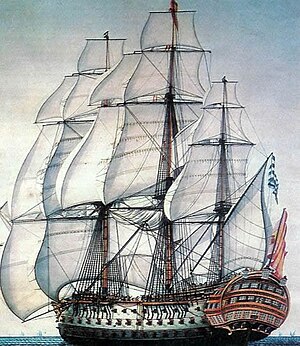Spanish ship Santísima Trinidad

Santísima Trinidad
|
|
| History | |
|---|---|
| Name: | Nuestra Señora de la Santísima Trinidad |
| Namesake: | Holy Trinity |
| Ordered: | March 12, 1768 |
| Builder: | Mateo Mullan |
| Launched: | Havana, Cuba, 3 March 1769 |
| Homeport: | Cadiz, Spain |
| Fate: | Captured at Trafalgar, 21 October 1805; scuttled 22 October |
| General characteristics | |
| Class and type: | 140-gun first-rate |
| Displacement: | 4,950 tons |
| Length: | 61.3 m (201 ft) |
| Beam: | 16.2 m (53 ft) |
| Draught: | 8.02 m (26.3 ft) |
| Troops: | ≈140 |
| Complement: | 950-1,050 |
| Armament: | |
Santísima Trinidad (officially named Nuestra Señora de la Santísima Trinidad by royal order on 12 March 1768, nicknamed La Real, sometimes confused with the galleon Santísima Trinidad y Nuestra Señora del Buen Fin) was a Spanish first-rate ship of the line with 112 guns. This was increased in 1795–96 to 130 guns by closing in the spar deck between the quarterdeck and forecastle, and around 1802 to 140 guns, thus creating what was in effect a continuous fourth gundeck although the extra guns added were actually relatively small. She was the heaviest-armed ship in the world when rebuilt, and bore the most guns of any ship of the line outfitted in the Age of Sail.
She was built at Havana, Cuba, to a design by Irish naval architect Matthew Mullan (domiciled in Spain under the name Mateo Mullán) and launched in 1769 as a 112-gun three-decker (some sources say 116 or even 120 guns). She was considerably larger than her British contemporary Victory and somewhat bigger than the French Bretagne.
There is no complete plan of the ship in existence, but there are of the 112-gun ship from 1765, from which the original dimensions of the ship may be found. Here, the units of length are the Spanish Burgos foot (27.86 cm) and the SI metre (100 cm), respectively: length = 213 2⁄3 (59.53); keel = 182 5⁄12 (50.82); beam = 57 3⁄4 (16.09); draught = 28 11⁄12 (8.06).
In 1795, her forecastle was joined to her quarterdeck to create a fourth deck containing a battery of eight pounder guns, giving her a total of 140 guns. Her armament seems to have been quickly reduced to 130 from 136 guns, but she still carried more guns than any other ship of her time. As the only ship with four gun decks, she was reputed to be the largest warship in the world, for which she was nicknamed El Escorial de los mares by the Spanish, until surpassed in sheer size by the new type French 120-gun ships such as Océan (1790) and Orient (1791).
...
Wikipedia
